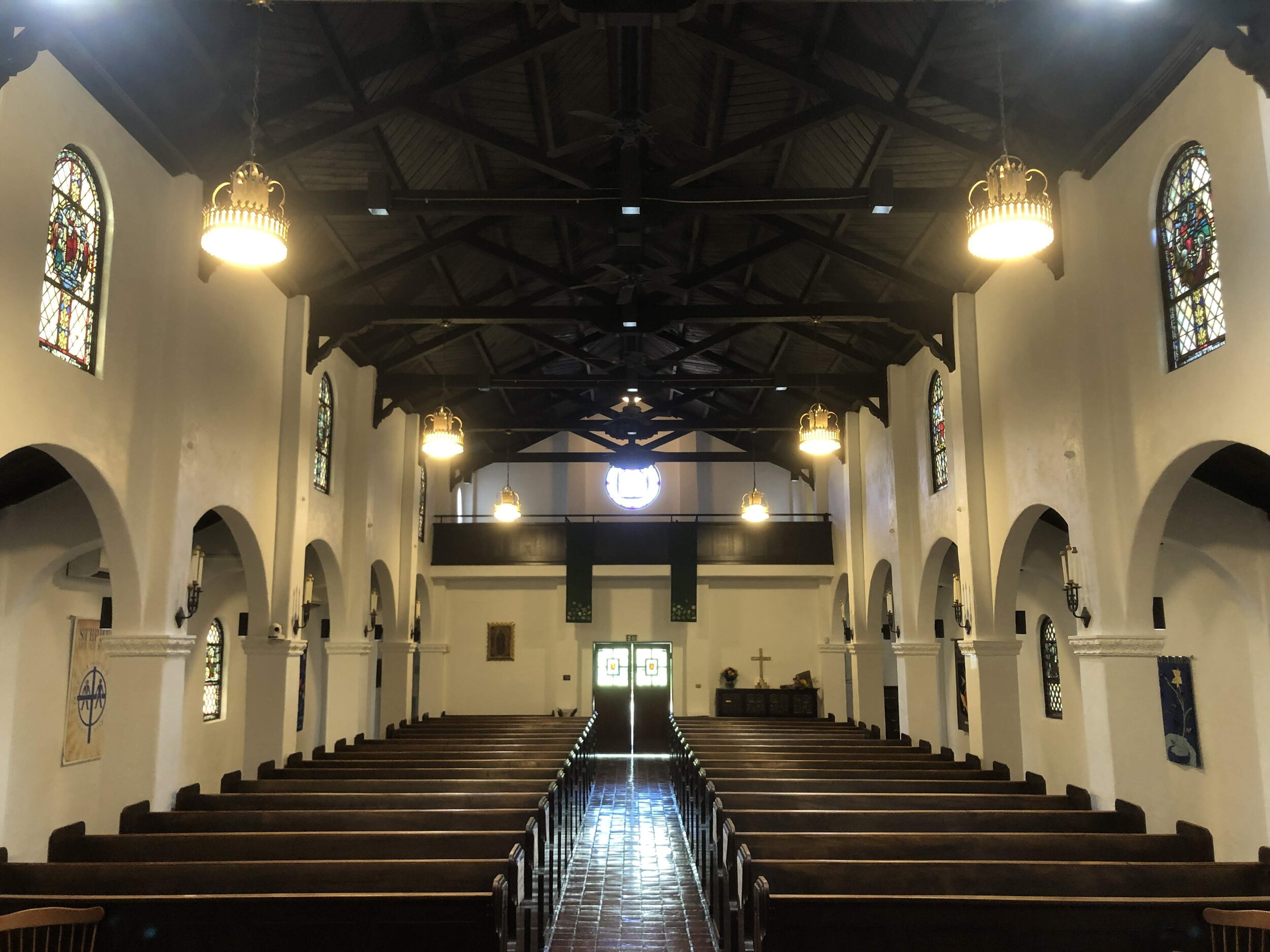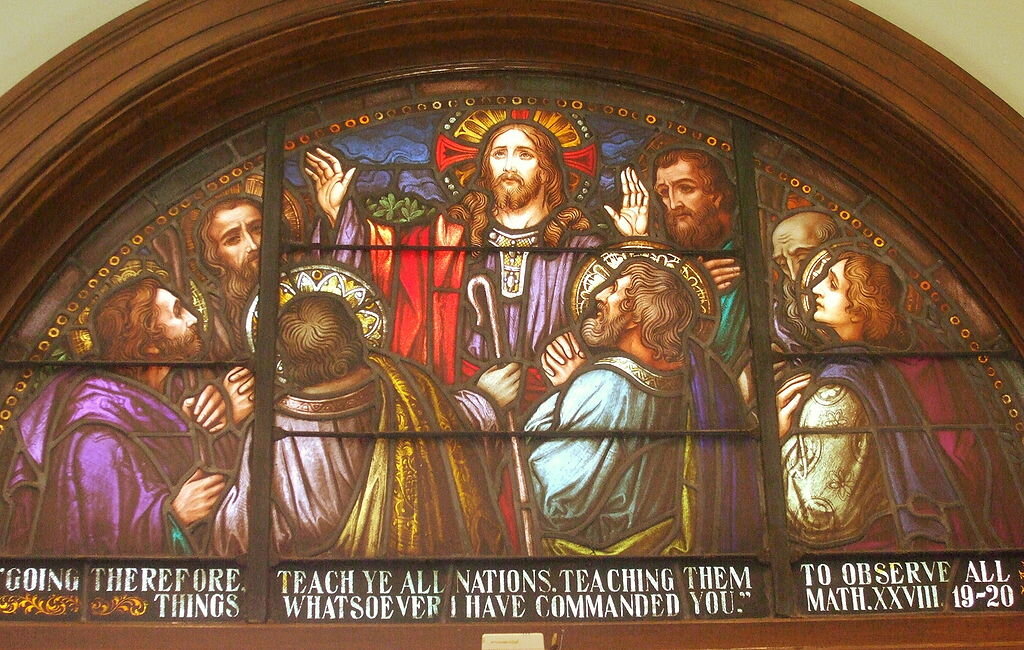by Fr. Bill Garrison
Please note that the following sermon text was provided prior to the audio recording. The two versions may differ substantially.
I do not understand my own actions. For I do not do what I want, but I do the very thing I hate. Now if I do what I do not want, I agree that the law is good. But in fact it is no longer I that do it, but sin that dwells within me. For I know that nothing good dwells within me, that is, in my flesh. I can will what is right, but I cannot do it. For I do not do the good I want, but the evil I do not want is what I do. Now if I do what I do not want, it is no longer I that do it, but sin that dwells within me.
So I find it to be a law that when I want to do what is good, evil lies close at hand. For I delight in the law of God in my inmost self, but I see in my members another law at war with the law of my mind, making me captive to the law of sin that dwells in my members. Wretched man that I am! Who will rescue me from this body of death? Thanks be to God through Jesus Christ our Lord!
—Romans 7:15-25a (NRSV)
Jesus said to the crowd, “To what will I compare this generation? It is like children sitting in the marketplaces and calling to one another,
‘We played the flute for you, and you did not dance;
we wailed, and you did not mourn.’
For John came neither eating nor drinking, and they say, ‘He has a demon’; the Son of Man came eating and drinking, and they say, ‘Look, a glutton and a drunkard, a friend of tax collectors and sinners!’ Yet wisdom is vindicated by her deeds.”
At that time Jesus said, “I thank you, Father, Lord of heaven and earth, because you have hidden these things from the wise and the intelligent and have revealed them to infants; yes, Father, for such was your gracious will. All things have been handed over to me by my Father; and no one knows the Son except the Father, and no one knows the Father except the Son and anyone to whom the Son chooses to reveal him.
“Come to me, all you that are weary and are carrying heavy burdens, and I will give you rest. Take my yoke upon you, and learn from me; for I am gentle and humble in heart, and you will find rest for your souls. For my yoke is easy, and my burden is light.”
—Matthew 11:16-19, 25-30 (NRSV)
Today we are talking about issues surrounding learning and acting on what we have learned. What gets in the way when we have trouble understanding the material presented? I thought we might start off with a story about a parent who was worried about their child’s difficulties and made an appointment with the teacher.
When the mother of the student arrived for her daughter’s parent-teacher conference, the teacher seemed a bit flustered, almost like she didn’t have time for the discussion. The teacher seemed especially uncomfortable when she started reporting to the mother that the little girl didn’t always pay attention in class, and was sometimes a bit flighty.
“For example, she’ll do the wrong page in the workbook,” the teacher explained, “and I’ve even found her sitting in the wrong desk.”
“I don’t understand that,” the mother replied defensively. “Where could she have gotten that I wonder?”
The teacher smiled reassuringly, and went on to let the mother know that her daughter was still doing fine in school and was sweet and likeable. Finally, after a pause, she added, “By the way, Mrs. Johnson, our appointment was for tomorrow.”
Ok, let’s start our discussion by talking about the reading from Romans we heard a few moments ago. Paul is lamenting his ability to learn it would seem. If I may, I would like to paraphrase his message.
I know what is good for me and what God recommends. But I don’t do it as often as I would like. And I know what is bad for me and shouldn’t do, but that turns out to be exactly what I do instead. What is wrong with me? It seems that something always sends me off course. If I don’t take God’s advice, and stick with it for my own welfare, have I really learned anything?
I know what Paul is saying. This is kind of a silly example I guess, but I think about the twenty or so extra pounds I carry that I know I would be better off without. I know I would be happier. My clothes would look better. I am sure I would be healthier. But still I don’t lose the weight. Temptation leads me astray constantly. So have I learned anything? It certainly wouldn’t appear so. What is the point of knowledge that does not result in action or change?
Ok, that’s a good start and the question about learning has been asked. Now let’s move on to the gospel. Jesus helps us motor down the road of understanding in this discussion about knowledge and the use of it a bit I think. Let’s listen again as Jesus speaks. “For John came neither eating or drinking, and they say, “He has a demon”; and the Son of Man came eating and drinking, and they say, “Look, a glutton and a drunkard, a friend of tax collectors and sinners!”
Jesus in his remarks is referring to those “in the know”, the folks in high places who have expectations and rules for holy people. If you don’t fit their mold you can’t be holy. You’ve got to eat and drink correctly, and do it with the right people especially. John and Jesus didn’t fit their expectations for a prophet and the son of God. As a result they just couldn’t be who the crowds thought they were. It made no sense to those in high places.
But hold the phone! Jesus continues. Listen, and learn. I quote him again as he utters the next sentence. “Yet wisdom is vindicated by her deeds.” Listen again. “Yet wisdom is vindicated by her deeds.”
He is saying the things that are being accomplished prove the point. What had the people seen and experienced? Thousands had repented and were baptized by John in the wilderness. Jesus had taught the people, fed the masses, healed the sick, and raised the dead. These are the deeds that tell us who John and Jesus truly were. Forget whether they met the expectations of those in power. It doesn’t matter. The deeds speak louder and truer than anything else ever could. Wisdom is to see the deeds and then to understand the truth. Listen to Wisdom. Learn from her. If you choose to listen and learn, then Jesus makes a promise. Hear his promise to them and to us.
“Come to me, all you that are weary and are carrying heavy burdens, and I will give you rest. Take my yoke upon you, and learn from me; for I am gentle and humble in heart, and you will find rest for you souls. For my yoke is easy, and my burden is light.”
Years ago when my grandson Bryce was young we often used to take him for walks. As time passed we would drive to a location we could not easily walk to from home and then get out of the car and start our adventure. One time we drove to the far eastern end of Yorba Linda and found ourselves walking through an orchard of orange trees. Bryce was doing his normal thing; chasing lizards, looking at birds, and running from place to place. But he seemed to be taking the trees in the orchard for granted, not even noticing them. I guess it was a case of not being able to see the trees for the forest.
Anyway, I walked over to a tree with him and pulled an orange off a branch. Then I peeled the orange and offered him a section. As he ate the slice of orange his eyes lit up and I knew that his understanding of life was changing in that moment. I knew he would never again see a tree in the same way, especially an orange tree. He now knew the tree by the fruit it had produced.
In the same way Jesus was telling the crowd to look at the fruit that was being produced in his ministry. He was suggesting to them and to us that true wisdom lies within the practice of following him, and from that practice comes the peace that passes all understanding.
I think we all know what Jesus is saying to be true. Following Jesus is the way to wisdom and peace. We all know it, but like the Apostle Paul we are not capable of always succeeding in the practice of following him, are we? We try but sometimes we do the things we don’t want to do rather the things we would prefer to be doing.
So here is a suggestion for all of us, me as much as you. Think about life as a meditation. We seek to stay on point in our meditation, to go inward to our quiet place, but sometimes outside noises and influences break our reverie. When that happens we are taught to gently bring ourselves back to the meditation, to be aware of the noise that thwarted our journey inward, and then to let it go. Gently forgiving ourselves and leaving the distraction behind as we get back on the path.
Following Jesus, Christianity if you will, I would submit is a way of life more than a religion. Sometimes we stay on course. Sometimes things cause us to stray. When we stray we are invited to be gentle and forgiving with ourselves, name the distraction and leave it behind. Then we can freely return to Jesus and the wisdom he so willingly gives away.
















![Stained glass: Alfred Handel, d. 1946[2], photo:Toby Hudson / CC BY-SA (https://creativecommons.org/licenses/by-sa/3.0)](https://images.squarespace-cdn.com/content/v1/571beb3be3214001fb407fd6/1588632415986-V8E734MVGGPZIADN0HE1/1024px-StJohnsAshfield_StainedGlass_GoodShepherd_Portrait.jpg)



